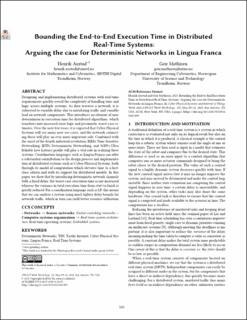| dc.contributor.author | Austad, Henrik | |
| dc.contributor.author | Mathisen, Geir | |
| dc.date.accessioned | 2023-06-13T11:30:57Z | |
| dc.date.available | 2023-06-13T11:30:57Z | |
| dc.date.created | 2023-05-31T16:04:06Z | |
| dc.date.issued | 2023 | |
| dc.identifier.citation | CPS-IoT Week '23: Proceedings of Cyber-Physical Systems and Internet of Things Week 2023. 2023, 343-348. | en_US |
| dc.identifier.isbn | 979-8-4007-0049-1 | |
| dc.identifier.uri | https://hdl.handle.net/11250/3071119 | |
| dc.description.abstract | Designing and implementing distributed systems with real-time requirements quickly reveal the complexity of handling time and logic across multiple systems. As data traverse a network, it is subjected to variable delay due to interfering traffic and variable load on network components. This introduces an element of non-determinism in execution time for distributed algorithms, which translates into increased error logic and pessimistic worst-case estimates. Over the next few years, it is expected that Cyber-Physical Systems will see many new use cases, and the network connecting these will play an ever more important role. Combined with the onset of the fourth industrial revolution, IEEEs Time Sensitive Networking, IETFs Deterministic Networking, and 3GPPs Ultra Reliable Low Latency profile will play a vital role in realizing these systems. Coordination languages such as Lingua Franca can offer a substantial contribution to the design process and implementation of distributed systems such as Cyber-Phyiscal Systems, both through its model of computation which elevates time to a first-class citizen and with its support for distributed models. In this paper, we show that by introducing deterministic network channels with a fixed delay, the worst-case execution time is not increased whereas the variance in total execution time from start to finish is greatly reduced. For a coordination language such as LF, this means that we can analyze a system using much tighter delay bounds for network traffic, which in turn can yield better resource utilization. | en_US |
| dc.language.iso | eng | en_US |
| dc.publisher | ACM | en_US |
| dc.relation.ispartof | CPS-IoT Week '23: Proceedings of Cyber-Physical Systems and Internet of Things Week 2023 | |
| dc.rights | Navngivelse 4.0 Internasjonal | * |
| dc.rights.uri | http://creativecommons.org/licenses/by/4.0/deed.no | * |
| dc.title | Bounding the End-to-End Execution Time in Distributed Real-Time Systems: Arguing the case for Deterministic Networks in Lingua Franca | en_US |
| dc.title.alternative | Bounding the End-to-End Execution Time in Distributed Real-Time Systems: Arguing the case for Deterministic Networks in Lingua Franca | en_US |
| dc.type | Chapter | en_US |
| dc.description.version | publishedVersion | en_US |
| dc.rights.holder | © 2023 Copyright held by the owner/author(s). | en_US |
| dc.source.pagenumber | 343-348 | en_US |
| dc.identifier.doi | 10.1145/3576914.3587499 | |
| dc.identifier.cristin | 2150541 | |
| dc.relation.project | Norges forskningsråd: 323340 | en_US |
| cristin.ispublished | true | |
| cristin.fulltext | original | |
| cristin.qualitycode | 1 | |

